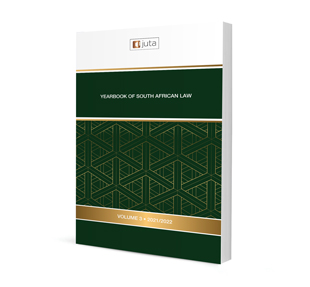Property Law
Author Elsabé van der Sijde
ISBN: 978 148514 016 0
Affiliations: LLB LLD (Stell) LLM (UP); Research fellow at the Department of Public Law, Stellenbosch University and fellow of the South African Research Chair in Property Law (SARCPL). The SARCPL is hosted by Stellenbosch University, funded by the Department of Science and Technology, and administered by the National Research Foundation. The financial support of the National Research Foundation is gratefully acknowledged. Thank you to Sameera Mahomedy, Goitsemang Mpudi, Corlia Kritzinger and Lamla Mafundityala for research assistance and to the editors for editorial review and assistance
Source: Yearbook of South African Law, Volume 3, p. 1119 – 1160
